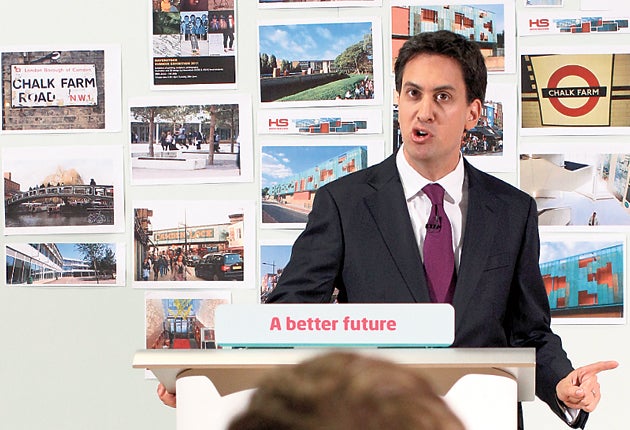Andy McSmith: Suddenly Miliband sounds different from Cameron. It may work
The Labour leader did not sound like the PM – but then neither did the man himself


Your support helps us to tell the story
From reproductive rights to climate change to Big Tech, The Independent is on the ground when the story is developing. Whether it's investigating the financials of Elon Musk's pro-Trump PAC or producing our latest documentary, 'The A Word', which shines a light on the American women fighting for reproductive rights, we know how important it is to parse out the facts from the messaging.
At such a critical moment in US history, we need reporters on the ground. Your donation allows us to keep sending journalists to speak to both sides of the story.
The Independent is trusted by Americans across the entire political spectrum. And unlike many other quality news outlets, we choose not to lock Americans out of our reporting and analysis with paywalls. We believe quality journalism should be available to everyone, paid for by those who can afford it.
Your support makes all the difference.Politicians all sound the same, it is sometimes said. But yesterday the Prime Minister and Leader of the Opposition took very different positions as they delivered their respective thoughts on last week's riots. Ed Miliband did not sound at all like David Cameron. Come to that, David Cameron did not sound much like himself.
The Conservative leader is the man who rescued his party from its "nasty" image by avoiding hardline talk on law and order, of the "prison works" type, which the party faithful love to hear.
He made a much misquoted speech on youth crime five years ago, pleading "let's try and understand what has gone wrong in these children's lives." It was the "hug a hoodie"speech, lampooned by Labour.
The Prime Minister was not hugging hoodies yesterday. The word 'understanding' did feature in his long speech in Oxfordshire, but other phrases rang out. "Right and wrong", "moral neutrality", "bad behaviour", "irresponsibility", "selfishness", "a concerted, all-out war on gangs and gang culture", "where are the parents?", "held back by bureaucracy", and "if you do the wrong thing you'll be disciplined" were all there, along with a passing mention of that old Tory cure for undisciplined youth, National Service.
This was Cameron's answer to those who think because he talked about understanding, he is not tough enough to deal with disorders on last week's scale. As he put it: "I want to make something very clear – I get it. This stuff matters."
In political terms, the strategy adopted by Ed Miliband has more risks. Older hands like Tony Blair, Gordon Brown, David Blunkett, Jack Straw or John Reid would never have let themselves be outflanked on crime by the Conservatives, because of long memories of how Labour almost self-destructed in the early 1980s. With eyes open, Ed Miliband has walked into political territory where no Labour leader has dared tread since he was a pupil at Haverstock Comprehensive school, the place where he gave yesterday's speech.
A call for understanding – the word Cameron was careful not to utter – was the centrepiece. He was deliberately agnostic about the underlying cause of the riots, even resisting the temptation to blame Tory cuts in the police budget. Criminality pure and simple, family breakdown, parents who fail to teach children right from wrong, and lack of opportunity all featured in his speech, but only Miliband denied that any one of them was a complete explanation for last week's events. He wants a commission to uncover the truth.
By taking this line, the Labour leader risks being accused of making excuses for rioting and looting. His answer to the charge is that choosing a 'simplistic' answer to a complex question is "not strength but an absolute abdication of responsibility." To buttress his case, he quoted words by a previous opposition leader who believed "there are connections between circumstances and behaviour" – David Cameron. Even if the Labour leader's strategy fails, Miliband can draw comfort from the fact that at last he is getting a hearing. The debate over the riots features Cameron versus Miliband, not Cameron versus Clegg, or the Tory right. If it works, Miliband will cast himself as the voice of reason who kept calm in a crisis, and will show up David Cameron as a man who said one thing when the going was easy and another in tough times. It is risky strategy, but it may work.
Join our commenting forum
Join thought-provoking conversations, follow other Independent readers and see their replies
Comments